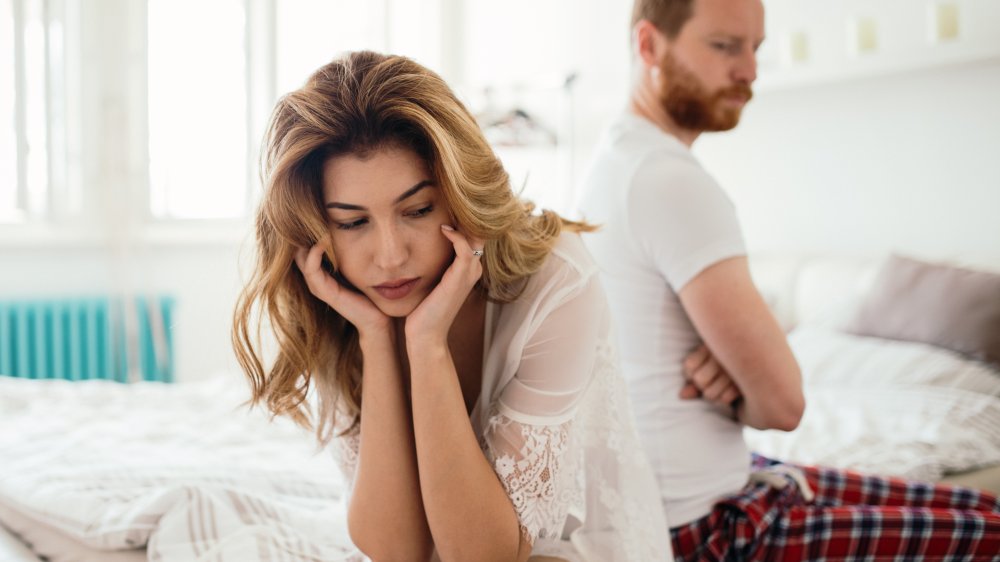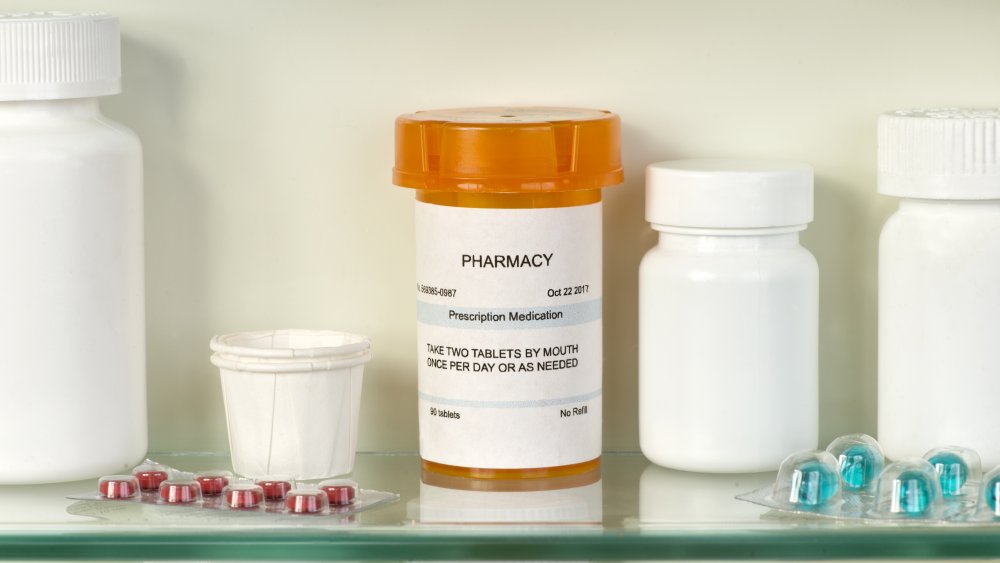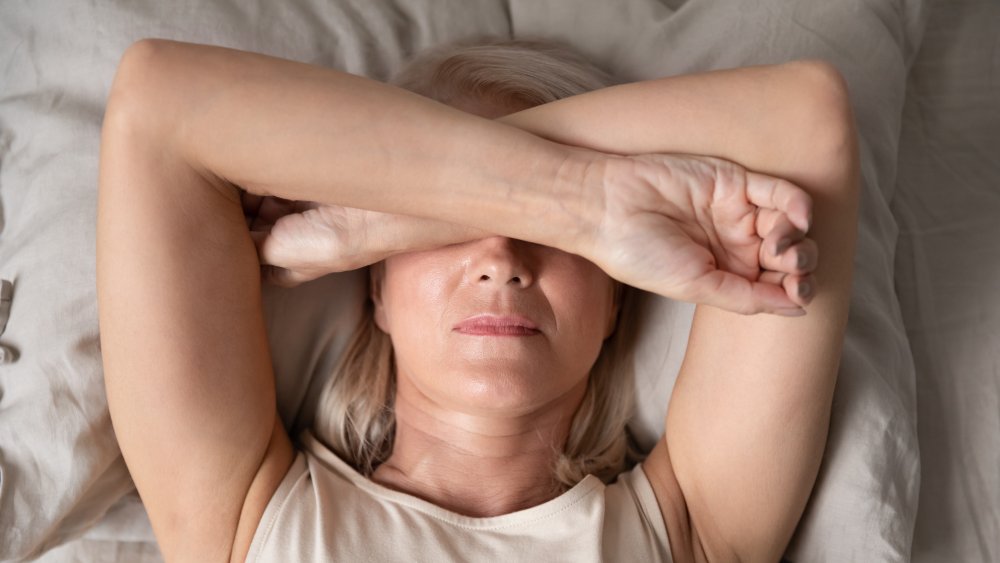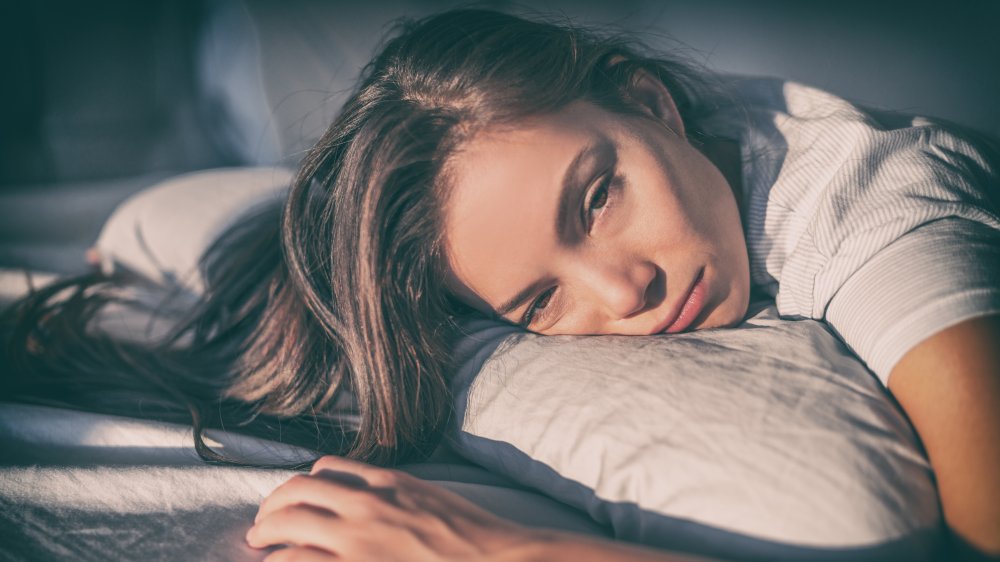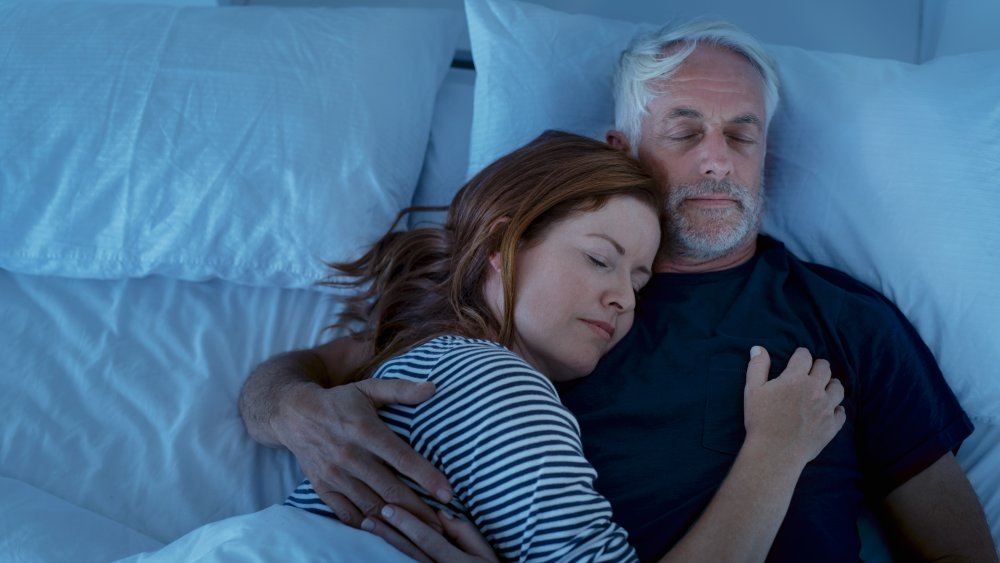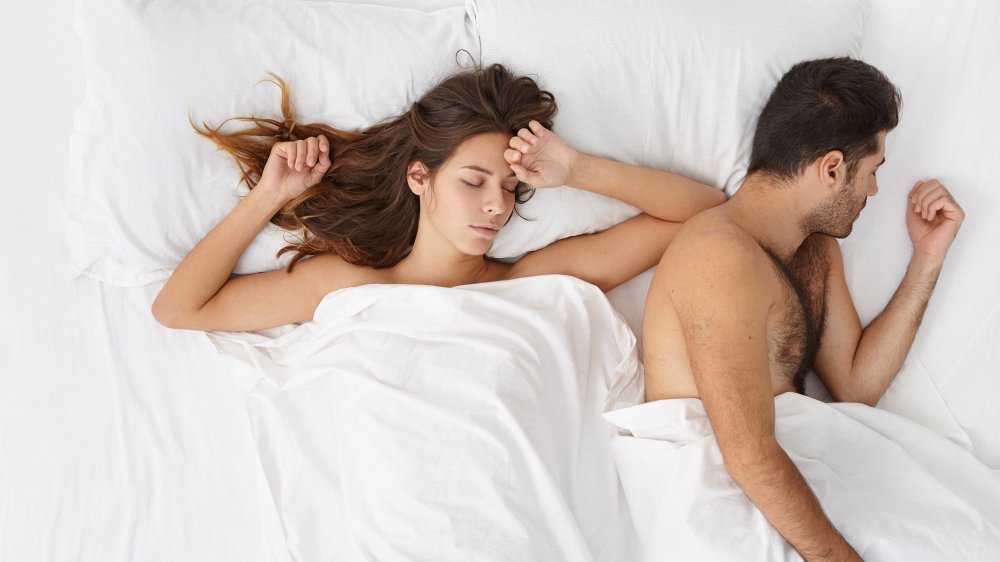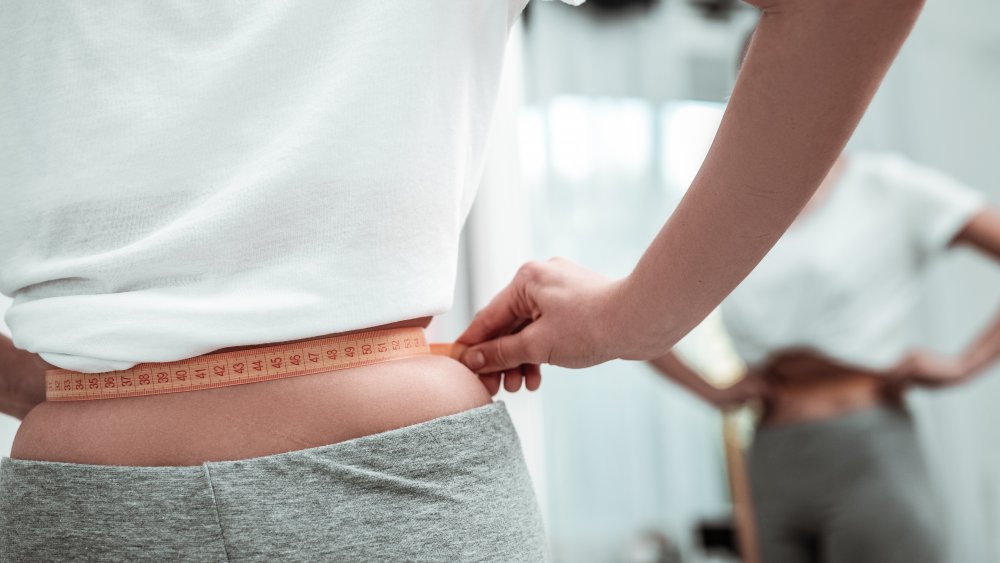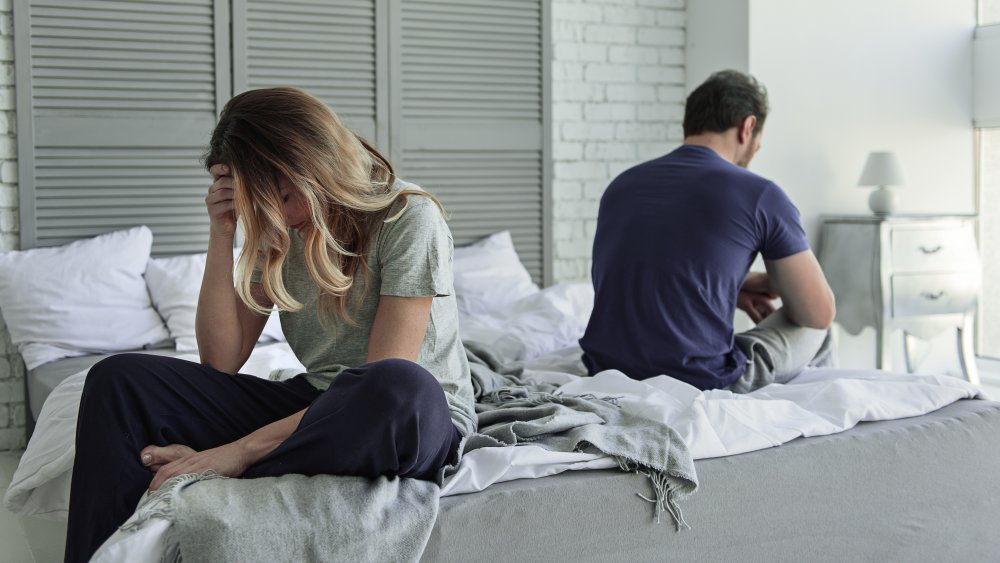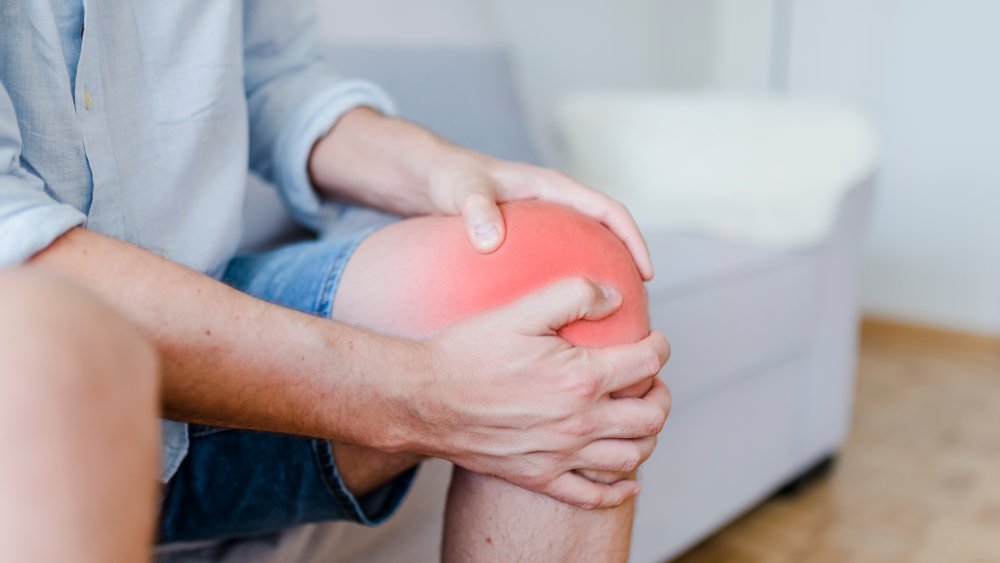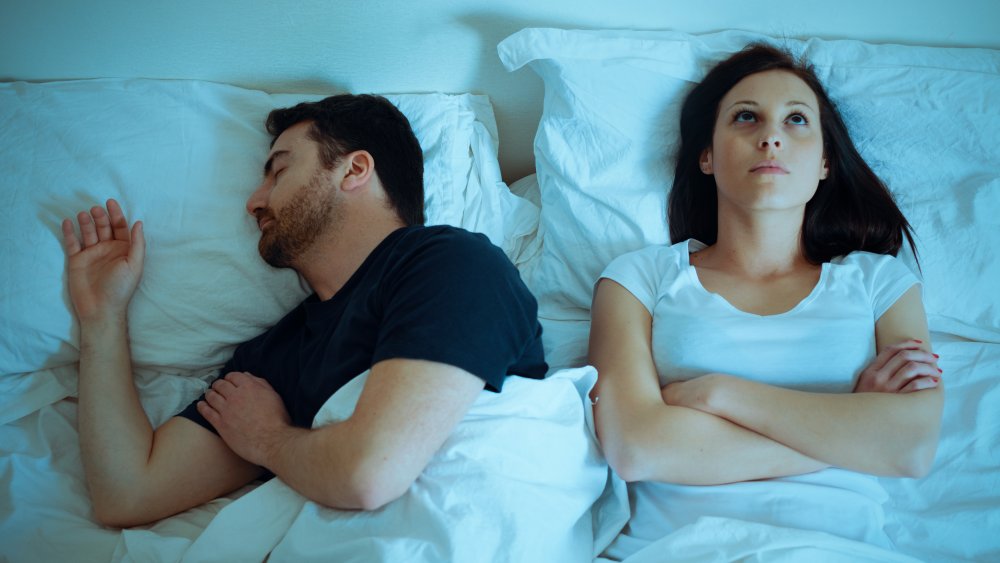If You've Lost Your Sex Drive, This Is Probably Why
You might be experiencing a declining sex drive if you can remember a time when the thought of sex was more exciting and the anticipation of getting there was half the fun. It happens from time to time — or it could be a perpetual issue you've had to face throughout adulthood.
When a loss of libido gets in the way of your happiness or leads to problems in your relationship, there are steps you can take to claim it back. First, you need to figure out what's happening with your body and mind. And, as it turns out, determining why you're feeling more tired and less titillated in the bedroom is actually not all that easy. There are several possible culprits to blame — some are physical, others are mental, emotional, and psychological. It could be low self-confidence, high stress, hormones, or a host of medical conditions. What's more, it may be a combination of a few different health and lifestyle factors.
Want to figure out what's causing your lackluster libido and get some starter tips about how you can help boost it back up? Health Digest is here to help you get your sexy on again.
If you've lost your sex drive, there could be a more serious condition at play
Seeking help for your low libido might not be at the top of your priority list, but a sudden decrease in sex drive could be indicative of other health problems. As noted by Your.MD, many people with "diabetes, cancer, cirrhosis of the liver," and other conditions may find they are no longer as interested as they used to be. What's more, a study published in ECS Heart Failure found that 60 to 87 percent of patients who had heart failure experienced some degree of sexual problems thereafter. For some men, the issue may appear as erectile dysfunction, while, for others, it can manifest as low libido.
For women, vaginismus could be the problem. OB-GYN Dr. Morgan West explained to HuffPost that this is "a disorder of the pelvic muscles that causes pelvic pain and issues with penetration." She elaborated that the discomfort associated with sex might drive a woman to avoid action altogether. Your thyroid could also be the culprit, as this hormone-producing gland plays a part in all your bodily functions (via HuffPost).
Of course, a waning libido alone is no reason to panic. It could be something less serious at play; talk to your doctor before jumping to conclusions.
The medications you're taking might be causing a lack of sex drive
If you have started a new prescription medication or your dose has been altered, it could be affecting your sex drive. Dr. Irwin Goldstein, a sexual medicine expert, told Time that some depression medications could hinder your hankering. SSRIs — or selective serotonin reuptake inhibitors (i.e. Prozac, Zoloft, etc.) — work to boost your levels of serotonin, which consequently can take a toll on your libido. This is why Dr. Raymond Hobbs, a physician at Detroit's Henry Ford Hospital, recommends trying "the lowest dose that accomplishes what you want," advising, "Start low and go slow." That way, hopefully, it won't affect your drive.
For those rushing to check their pill bottles: Beta blockers and birth control pills are also on the long list of offending options. Even antihistamines can have a temporarily dampening effect (via Time).
Anti-seizure medications are libido-lowering, too. As pointed out by Dr. Goldstein, since an orgasm is physically similar to a seizure, treatments that are designed to suppress "nerve impulses" may also lower your enjoyment. And a lack of sexual satisfaction can lead to a reduced appetite. If you're taking a certain medication and notice a difference in your libido, talk to your doctor about other options.
Hormonal changes could be the cause of a low sex drive
You can blame hormones for just about everything — including a loss of libido.
According to The North American Menopause Society "during the menopause transition, the physical effects of falling estrogen levels — including hot flashes, night sweats, and vaginal dryness — can undermine sexual motivation and drive." Furthermore, a reduction in testosterone levels, may add fuel to the fire — or lack thereof.
Menopause isn't the only time hormones may affect your sex drive. Birth control pills can reduce your testosterone level and subsequently reduce your desire. Conversely, physician Dr. Raymond Hobbs told Time that you could have the opposite reaction, saying, "Taking the pill is very effective and [women who are] more confident in their birth control device... find that their sexuality improves." But if you do notice a negative difference, you may want to try an IUD, as its a non-hormonal form of contraception — as are good old-fashioned condoms, as explained by sexual medicine specialist Dr. Irwin Goldstein (via Time).
Depression makes you moody and can take you out of the mood
When you're feeling dejected and hopeless, having sex is probably the last thing on your mind.
Dr. Jennifer Payne, director of the Women's Mood Disorders Center at Johns Hopkins, explained in a post on Johns Hopkins' website that "the inability to enjoy things you normally enjoy, like sex" is a major red flag in diagnosing depression. Dr. Frederick K. Goodwin, who's on the council for the National Alliance for Research on Schizophrenia and Depression, echoed this statement in an article on WebMD, saying, "The whole process of sexual arousal starts with the ability to anticipate pleasure, which is lost with depression."
Furthermore, Dr. Payne elaborated that those dealing with a serious mental disorder tend to be perpetually unenthused, have low confidence, and may even harbor resentment towards their partner. But it's not all gloom and doom for those feeling down in the dumps. In addition to seeking therapy and treatment, Payne also suggests mustering up the will to copulate despite having zero motivation. Her reasoning? You want to avoid it becoming a "self-fulfilling prophecy." And the idea — and hope — is that sex now will eventually beget more sex later.
Too much booze could be bad for your sex drive
Some wine or a few cocktails might take the edge off and make you feel more relaxed. Sounds like a recipe for a sexy night, no? Not necessarily.
According to Everyday Health, "alcohol is a depressant," and moderate to heavy drinking could take you from feeling in the mood to feeling, well, moody — ultimately reducing your sexual appetite. Furthermore, a man who has been drinking a little too much might be hard-pressed to get an erection, further killing the moment. Stick to one or two glasses if you want to have a romantic evening.
Drinking isn't the only lifestyle habit that can affect your sex drive. Smoking cigarettes can also hinder your chances of getting it on. A study cited by WebMD found that smoking reduced a man's sexual appetite and overall satisfaction — so you might want to drop the butt if you hope to keep the flame alive.
A loss of sex drive could just be your age catching up with you
A decline in sex drive might not be an indication that something is wrong. It could just be a natural progression to a new stage of life. In other words, yes, you are getting older.
As noted by WebMD, men have high levels of testosterone in their 20s, and usually continue to have strong and frequent urges throughout their 30s and 40s, despite the fact the sex hormone level starts to gradually decrease around the time a man turns 35. On the other hand, women, who are most fertile in their early 20s, often experience a spike in sex drive in their early 30s. Of course, as previously noted as a women gets closer to menopause, her libido might not be the same as it used to be.
Everyone is different, though, and there are lots of other external factors at play. If you are not happy with the current state of your sex drive, talk to your doctor; there are options.
You are just too exhausted to bother to have sex
"Not tonight, honey." If exhaustion is the reason you are turning your nose up at nookie, you are not alone by a long shot. Research by the National Sleep Foundation, cited by Good Housekeeping, found that 25 percent of people reported being too tired to have sex with their other half much of the time. We are all too busy to get busy, and too desperate for some extra Zs.
Fortunately, there are ways to reclaim your sex life and get your excitement up about getting down. One simple solution: go to bed earlier. You'll have more time for sexing and snoozing — win-win! And if you still can't get on board with sex after dark, try spicing things up during the daylight hours. Good Housekeeping suggests having a quickie first thing in the morning (set the alarm!), or do the deed while the kids (if you have them) are otherwise occupied. Most importantly, keep the lines of communication open and try to be intimate — if not overtly sexual — when the opportunity presents itself.
Low self-esteem could be lowering your libido
You know the expression you have to love yourself first? The reality is this often applies to sex. In order to have the want and will to get naked and sexy with someone else, you have to feel comfortable and confident in your own skin.
As explained by certified sex therapist Laurie Watson in an article she penned for Psychology Today, there are two types of body image issues that can lower a woman's self-esteem and subsequently her sex drive: "what she thinks of herself and what she believes her partner thinks of her body." She stresses to patients and readers that it's important women cut out the "negative self-talk before and during sex." Instead, she advises focusing on the physical sensation and emotional bonding. Furthermore, she said that women should notice how their body attracts and arouses their partner, noting, "Acknowledge the physical evidence that he does find you desirable."
Stress can be a stressor on your desire and sex drive
If you are bogged down at work, dealing with parenting dilemmas, feeling the grind of day-to-day life, or — you know — all of the above, your sex life might be paying the price. Makes sense since there are serious ways stress can damage your body.
According to Verywell Mind, stress incites the release of the two major stress hormones: cortisol and epinephrine. During episodes of acute stress, they may put a temporary damper on your desire. However, when stress is chronic, your "body uses sex hormones to meet the increased demands for higher cortisol production," further reducing your drive. Additionally, on a psychological and emotional level, stress messes with your mood and can leave you feeling pulled in a million different directions. Suffice to say, this frenzied feeling might "distract you from wanting sex or being present during sex."
Some healthy coping mechanisms can help you address the stress that's wearing on you and your sex life. As suggested by Verywell Mind, try breathing exercises and meditation. Most importantly, carve out time for your relationship. It can feel like an impossible feat when you're juggling everything, but some quality time together might help take the edge off and boost your drive.
Exercising too much could cause your sex drive to drop
If you have been taking on extra rigorous workouts lately, the intensity and/or frequency could be to blame for your plummeting sex drive.
A study published in Medicine & Science in Sports & Exercise found that excessive exercise can, indeed, lower a man's libido. On the other hand, an insufficient amount of exercise can also affect it, as noted by Healthline.
The site points out that a healthy amount of exercise can lower one's "risk for chronic conditions such as obesity, high blood pressure, and type 2 diabetes." Since all of these conditions are also linked to a reduced sexual appetite, the law of deduction says some physical activity can help. Furthermore, working out can reduce your nighttime levels of cortisol (the stress hormone), making it more agreeable and more likely for you to want to get, well, even more physically active at bedtime. So, for the sake of your overall health and your overall satisfaction, hit the gym and challenge yourself, but don't overdo it.
Restless leg syndrome could potentially lower your sex drive
Restless leg syndrome (RSL) is more common among women than men (via Sleep Medicine Reviews); however, males who are kept up at night by leg discomfort and the perpetual compulsion to move and kick their lower limbs might also find they are affected in a sexual capacity.
A study in the American Journal of Epidemiology found that men who have been diagnosed with restless leg syndrome are more prone to experiencing erectile dysfunction, meaning that they frequently are unable to get an erection or have trouble keeping one. While this is different than a loss of sex drive, ED can also lower a man's confidence in the bedroom and subsequently cause his interest in sex to wane.
What's more, the aforementioned research has noted that men who experience RLS more intensely and more frequently also have an increased likelihood of developing impotency.
Sleep apnea may be messing with your sex drive
Do you have trouble sleeping at night? Do you wake yourself or your partner up with your snoring? If it is obstructive sleep apnea keeping you awake, it might also be keeping your sex life less than brag worthy.
Research published in the Journal of Clinical Sleep Medicine indicated that as many as one-third of "nonobese men" who have regular episodes of obstructive sleep apnea have reduced levels of testosterone — potentially resulting in a decline in sexual drive.
But it might not be the sleep apnea itself that is leading to this hormonal discrepancy. It is more likely linked to the lack of sleep it causes. Another study in the Journal of the American Medical Association found that a healthy man's testosterone level was reduced by up to 15 percent after seven nights of inadequate sleep. Interestingly, the low levels were most notable between 2 p.m. and 2 a.m. the following day. So maybe consider experimenting with early morning sex. Better yet, try to get some solid Zs and talk to your doctor about sleep apnea treatment options.
Pregnancy and breastfeeding could mess with your sex drive
Menopause is not the only time hormones will affect a woman's libido. She may experience a drop in sex drive if she becomes pregnant. As noted by a study published in The Journal of Sexual Medicine, many women report that their desire to have sex increasingly wanes as pregnancy progresses; no surprise there — with a burgeoning belly and unpleasant symptoms, having sex is probably the last thing on a soon-to-be mom's mind.
As noted by Verywell Family, during the early weeks of pregnancy, a woman will experience a spike in the sex hormones estrogen and progesterone. But this increase will often accompany exhaustion and morning sickness. Fortunately, many women will start to feel better by the end of the first trimester or beginning of the second. What's more her energy may be restored and "an increase in vaginal lubrication, accompanied by the engorgement of the clitoris and vagina," could turn her dry sex life around.
Your desire might diminish again once Baby is born. First, because, well, your waking hours will be out of whack. But this may be especially true if you're breastfeeding, as levels of estrogen and testosterone will remain low (via Healthy Women).
Lack of intimacy or relationship problems could be causing your decreased sex drive
If you've ever held a grudge and withheld sex, you know that intimacy, sexuality, and relationship problems can become one big tangled issue.
Sex psychologist Dr. Sheryl Kingsberg admitted to WebMD that getting to the heart of a sex drive problem is not always easy — especially when we're talking about a woman's libido: "Women's sexuality tends to be multifaceted and fairly complicated." She noted, "Above and beyond horniness, it is the sense of intimacy in the relationship. If you are mad at your spouse, you could be horny but you're not going want to be sexual with that particular person."
Harvard Medical School assistant professor Dr. Jan Shifren echoed this statement, explaining that it is often a mix of physiological and psychological factors at play: "They're not just complaining of one plumbing problem. So we have to be more thoughtful in our approaches to treatment." Her often first approach to addressing the issue of a declining sex drive in her patients is with relationship therapy and sex therapy (via WebMD).

